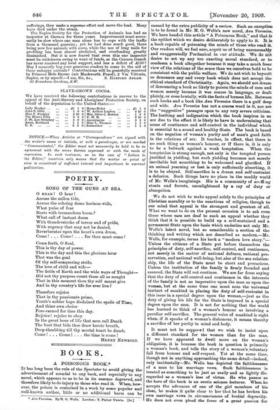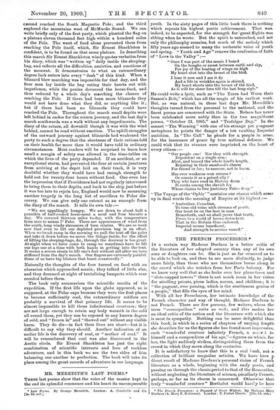BOOKS.
A POISONOUS l300K.* IT has long been the rule of the Spectator to avoid giving the advertisement of scandal to any book, and especially to any novel, which appears to us to be in its essence depraved, and therefore likely to do injury to those who read it. When, how- ever, the poison is contained in a work by some popular and well-known author, little or no additional harm can be
• Inn 'Veronica. By H. G. Wells. London: T. Fisher Unwin. [6s.]
caused by the extra publicity of a review. Such an exception is to be found in Mr. H. G. Wells's new novel, Ann Veronica. We have beaded this article " A Poisonous Book," and that is the epithet which we desire deliberately to apply to it. It is a book capable of poisoning the minds of those who read it. Our readers will, we feel sure, acquit us of being unreasonably and exaggeratedly Puritanical in our attitude. We do not
desire to set up any too exacting moral standard, or to condemn a book altogether because it may take a much freer
view of the relations of the sexes than we ourselves hold to be consistent with the public welfare. We de not wish to boycott or denounce any and every book which does not accept the ethical standard of Christianity. Again, we should not dream of denouncing a book RS likely to poison the minds of men and women merely because it was coarse in language, or dealt plainly, or even brutally, with the facts of human life. Between such books and a book like Ann Veronica there is a gulf deep and wide. Ann Veronica has not a coarse word in it, nor are the "suggestive" passages open to any very severe criticism. The loathing and indignation which the book inspires in us are due to the effect it is likely to have in undermining that sense of continence and self-control in the individual which is essential to a sound and healthy Stata The book is based on the negation of woman's purity and of man's good faith in the relations of sex. It teaches, in effect, that there is no such thing as "woman's honour, or if there is, it is only to be a bulwatic against .a weak temptation. When the temptation is strong enough, not only is the tempted person justified in yielding, but such yielding becomes not merely inevitable but something -to be welcomed and glorified. If an animal yearning or lust is only sufficiently absorbing, it is to be obeyed. Sell-sacrifice is a dream and self-restraint a delusion. Such things have no place in the muddy world of Mr. Wells's imaginings. His is a community of settling stoats and ferrets, unenlightened by a ray of duty or abnegation.
• We do not wish to make appeal solely to the principles of Christian morality or to the sanctions of religion, though to our mind that appeal is the strongest and greatest of all. What we want to do on the present occasion is to ask even those whose ears are deaf to such an appeal whether they think that it is possible to build up a self-sustained and a permanent State upon the basis which underlies not only Mr. Wells's latest novel, but so considerable a section of the thinking and writing which are described as modern.—Mr. Wells, for example, terms his book a "modern love story."— Unless the citizens of a State put before themselves the principles of duty, self-sacrifice, self-control, and continence, not merely in the matter of national defence, national pre- servation, and national well-being, but also a the sex relation- ship, the life of the State must be short and precarious. Unless the institution of the family is firmly founded and assured, the State will not continue. We are far from saying that the duty of self-control and continence in the interests of the family is not as imperative upon the man as upon the woman, but at the same time one must note the universal instinct of mankind in placing the duty of self-restraint in this issue in a special degree upon the woman,—just as the duty of giving his life for the State is imposed in a special degree upon the man. It is not for nothing that the world has learned to think of a woman's honour as involving a peculiar self-sacrifice. The general voice of mankind is right when, if it speaks of a woman's dishonour, it means thereby a sacrifice of her purity in mind and body.
It must not be supporei that we wish to insist upon a different standard for the woman than for the men. If we have appeared to dwell more on the woman's obligation, it is because the book in question is primarily a woman's book, and tells the story of a woman's.voltuitary fall from honour and self-respect. Yet at the same time, though not in anything approaching the same detail—indeed, only incidentally—Mr. Wells has depicted the faithlessness of a man to his marriage vows. Sash faithlessness is treated as something to be just as easily and as lightly dis- regarded as a woman's loss of virtue. He who passes as the hero of the book is an erotic science lecturer. When he accepts the advances of one of the girl members of his class, he makes it quite clear to her that he has broken his own marriage vows in circumstances of bestial depravity. He does not even plead the force of a great passion for
second reached the South Magnetic Pole; and the third explored the mountains west of McMurdo Sound. We can write briefly only of the first party, which planted the flag on a plateau eleven thousand feet high within a hundred miles of the Pole. The want of food alone prevented them from reaching the Pole itself, which, Sir Ernest Shackleton is confident, is to be found on that same plateau. In describing this march Sir Ernest Shackleton wisely quotes verbatim from his diary, which was "written up" daily inside the sleeping.
bag, and reflects all the difficulties, anxieties, and emotions of the moment. It demonstrates to what an extraordinary degree luck enters into every " dash " of this kind. When a blizzard blew marching was impossible for that day, and the four men lay inside the bag eating their hearts out with impatience, while the ponies devoured the horse-food, and thus reduced by a whole day's marching the chance of reaching the Pole. If there had been more blizzards they would not have done what they did, or anything like it ; but if there had been no blizzards they could have
reached the Pole. Throughout the march small depots were left behind in caches for the return journey, and the last day's march southwards was a walk without any impedimenta. The diary of the return, all downhill though it was with the wind behind, cannot be read without emotion. The uphill struggles
of the outward journey against blizzards had weakened the party to such a degree that the shortness of their rations told on their health far more than it would have told in ordinary circumstances. Moat readers will be surprised to learn how small a margin of safety was allowed in the time-tables on which the lives of the party depended. If an accident, or an exceptional storm, had prevented the four at certain junctures from arriving at the depot laid on their track, it is very doubtful whether they, would have had enough strength to hold out for twenty-four hours without food. One even bas the impression that if Providence had not regularly intervened to bring them to their depots, and back to the ship just before it was too late to rejoin her, England would now be mourning another tragedy in the long list of sacrifices to Polar dis- covery. We can give only one extract as an example from the diary of the march. It tells its own tale :—
" We are appallingly hungry. We are down to about half a pannikin of half-cooked horse-meat a meal and four biscuits a day. We covered thirteen miles to-day, with the temperature from zero to minus 7° Fahr. There are appearances of wind from the south, long windy streamers of torn stratus. We are so weak now that even to lift our depleted provision bag is an effort. When we break camp in the morning we pull the tent off the poles and take it down before we move the things inside, for the effort of lifting the sleeping-bags, &c., through the doorway is too great. At night when we have come to camp we sometimes have to lift our legs one at a time with both hands in getting into the tent. It seems a severe strain to lift one's feet without aid after we have stiffened from the day's march. Our fingers are extremely painful. Some of us have big blisters that burst occasionally."
Naturally the thoughts of the four turned on food with an obsession which approached mania; they talked of little else, and they dreamed at night of tantalising banquets which ever receded before them.
The book only summarises the scientific results of the expedition. If the first life upon the globe appeared, as is supposed, at the Polar caps because they were the first places to become sufficiently cool, the extraordinary rotifers are probably a survival of that primary life. It seems to be almost impossible to kill these infinitesimal creatures ; they are not large enough to retain any body warmth in the cold all round them, yet they can be exposed to any known degree of cold, and "frozen in" and "thawed out" without any visible harm. They do die—in fact their lives are short—but it is difficult to say why they should. Another indication of an earlier life is the discovery of coal, or "mother of coal." It will be remembered that coal was also discovered in the Arctic circle. Sir Ernest Shackleton has just the right combination of scientific interests and love of reckless adventure, and in this book we see the two sides of him balancing one another to perfection. The book will take its place among the great records of adventure in our language.

























































 Previous page
Previous page